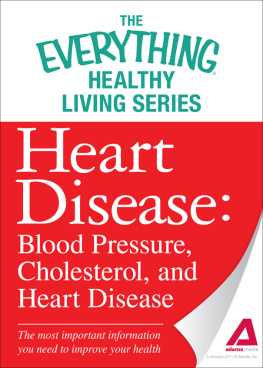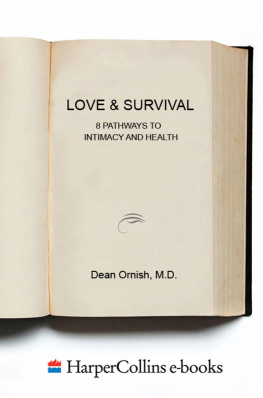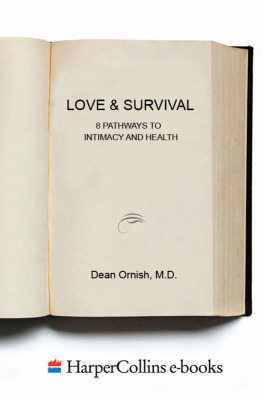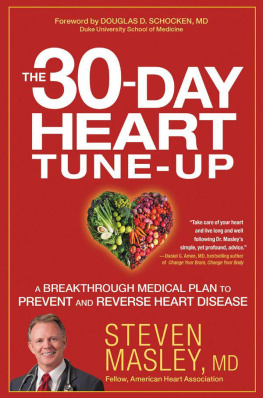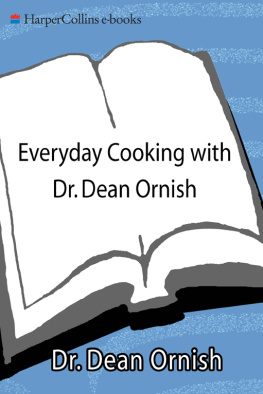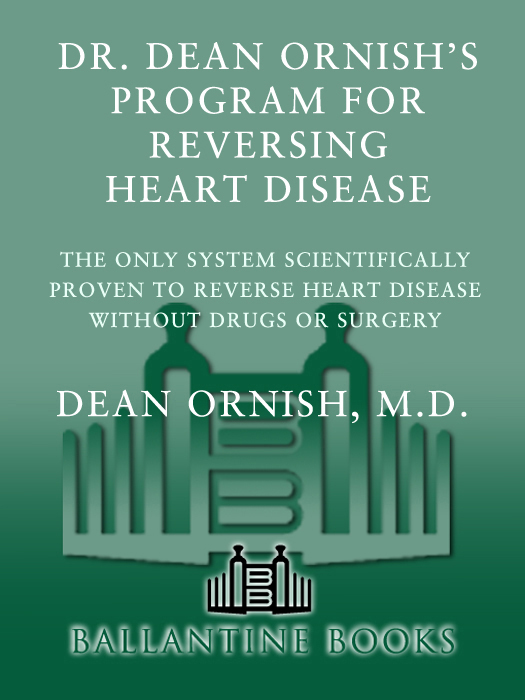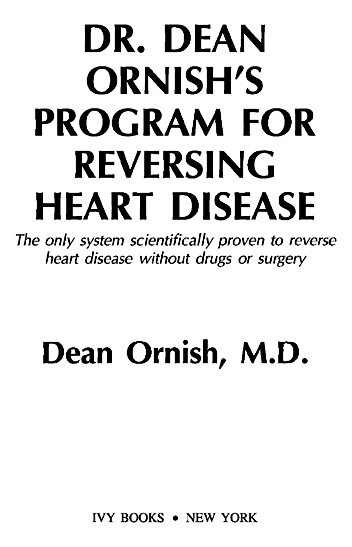More praise for
Dr. Dean Ornish
For Dean Ornishs cardiovascular patients, open heart doesnt mean bypass surgery. His is a spiritual sort of open heartas in open your heart. Ornish, with his noninvasive techniques, is accomplishing the same ends as are his scalpel-wielding colleagues.
The Washington Post
Revolution is brewing. Until very recently, doctors believed that the ravages of heart disease, the nations #1 killer, were irreversiblethat by the time cholesterol deposits had so choked the vital blood vessels feeding the heart as to bring on chest pains or heart attack, patients had no hope of ever again having a healthy heart. Now a growing body of research shows that people can actually clean out their coronary arteries. The first hard evidence that lifestyle changes aloneno drugs, no surgerycan set heart-disease patients on the road to improved health appeared in a study directed by Dr. Dean Ornish.
U.S. News & World Report
This is more than a book on reversing heart disease; it is a powerful and wise prescription for opening the heart in its deepest sense. Dr. Ornishs humanity, wit, and integrity shine through on every page, affirming the best of what medicine has to offer. You dont have to have heart disease to be healed through this extraordinary book and program.
J OAN B ORYSENKO , P H .D.
Dr. Ornishs research offers strong scientific evidence that lifestyle changes alone can actually reverse the progression of the atherosclerotic plaques in coronary arteries. These lifestyle changes can begin to reverse even severe coronary artery disease after only one year, without the use of cholesterol-lowering drugs.
C LAUDE L ENFANT , M.D.
Director, National Heart, Lung, & Blood Institute
National Institutes of Health
Strict changes in diet and lifestyle can not only prevent heart attacks but can actually reverse the clogging o the arteries according to a study conducted by Dr. Dean Ornish. The findings may have far-reaching implications for the treatment of severe heart disease, offering patients a low-risk alternative to cholesterol-lowering drugs, bypass operations, and angioplasty.
The New York Times
In his book, Ornish describes how changes in lifestyle alone, like reducing stress as well as fat, can effectively reverse heart disease.
Time
Dr. Ornishs landmark research validates the advice he provides.
A LEXANDER L EAF , M.D.
Chairman, Department of Preventive
Medicine and Clinical Epidemiology
Harvard Medical School
Dr. Ornishs program can lead to a better life as well as a longer one. It is the only program scientifically validated to begin reversing even severe coronary disease without using cholesterol-lowering drugs or surgery.
D R . S TEPHEN M. W EISS , P H .D.
Chief, Behavioral Medicine Branch
National Heart, Lung, & Blood Institute
National Institutes of Health
This is an epochal book. It sets a new standard in our understanding of heart disease, and it is the template against which all other books on any disease whatsoever should be judged. For the purity of the science on which it rests, and for the majesty of its spiritual wisdom, this book has no equal in the literature of medicine and health.
L ARRY D OSSEY , M.D.
Author of Recovering the Soul
Dr. Ornish is on the right road and we need to get on it also.
W ILLIAM C. R OBERTS , M.D.
Editor in Chief
American Journal of Cardiology
For the first time, we have a carefully done scientific study that shows, even in advanced stages, this disease can be reversed with lifestyle changes. This is a landmark study.
Readers Digest
By Dr. Dean Ornish, M.D.:
STRESS, DIET & YOUR HEART
DR. DEAN ORNISHS PROGRAM FOR REVERSING HEART DISEASE
*Published by Ballantine Books
For Gerald and Barbara Hines, who made the research possible;
for my parents, who made me possible;
for S. S. Satchidananda, who helped me to see what is possible
Acknowledgments
Commitment
Until one is committed there is hesitancy, the chance to draw back, always ineffectiveness. Concerning all acts of initiative (and creation), there is one elementary truth, the ignorance of which kills countless ideas and splendid plans: that the moment one definitely commits oneself, then Providence moves too. All sorts of things occur to help one that would never otherwise have occurred. A whole stream of events issues from the decision, raising in ones favor all manner of unforeseen incidents and meetings and material assistance, which no man could have dreamt would have come his way.
I have learned a deep respect for one of Goethes couplets: Whatever you can do, or dream you can, begin it. / Boldness has genius, power, and magic in it.
W. H. Murray,
The Scottish Himalayan Expedition
While I would like to take full credit for this book and for the success of the cardiovascular research on which it is based, it would be foolish of me to do so. Although this book is titled Dr. Dean Ornishs Program for Reversing Heart Disease, several people helped me develop this program, and many others provided the resources and support that enabled us to prove how powerful it can be. None of this work would have been possible without their dedication, generosity, and vision. (I wanted to call this book Opening Your Heart, since it describes the physical, emotional, and spiritual dimensions of opening the heart, but the publisher chose a more straightforward title.)
Each person named here made an important difference, without whom the research or this book would not have been possible. Although the list is somewhat long, it is incomplete. Ive enjoyed writing this section because its given me an opportunity to remember how meaningful each persons contribution has been and how grateful I am.
Whether research is considered pioneering or fringe is a matter of vision and faith. Several people provided encouragement and financial support at a time when this project was only a dream. Gerald and Barbara Hines not only provided major financial support but also encouraged many of their friends and business associates to do the same. In 1984, Mr. Hines and I founded the Preventive Medicine Research Institute, a nonprofit public research organization, to administer this research project, and he became chairman. (Tom Silk, Betsy Adler, and Barbara Ginsberg provided legal assistance.) Other board members included Martin Bucksbaum, Henry Groppe, Jenard Gross, Kenneth Lay, Frank Lorenzo, Stuart Moldaw, Ken Pelletier, Jay Pritzker, and Fenton Talbott. Mr. Lorenzo also provided air transportation on Continental Airlines for our research patients to fly to and from Houston for cardiac PET scans at the University of Texas Medical School.
Henry Groppe has been my friend, guardian angel, and confidante since 1979. In the academic world, Alexander Leaf, M.D., has been a mentor and role model. I feel very blessed to know both of them. Others whose advice was especially meaningful included Henry Blackburn, M.D., David Blankenborn, M.D., B. Greg Brown, M.D., William P. Castelli, M.D., Antonio M. Gotto, Jr., M.D., John Kane, M.D., Ph.D., Julius R. Krevans, M.D., Michael Lerner, Ph.D., Albert R. Martin, M.D., John ONeil, William R. Owen, M.D., Doros Platika, M.D., John T. Potts, Jr., M.D., Rachel Naomi Remen, M.D., Jonas Salk, M.D., Steven A. Schroeder, M.D., John Stoeckle, M.D., as well as the scientific advisors, officers, and staff of the Institute for the Advancement of Health.


